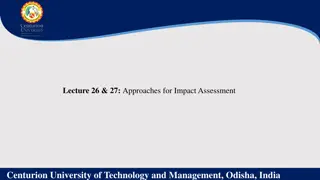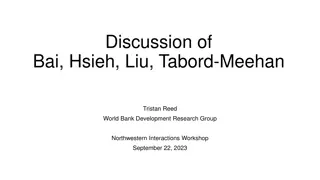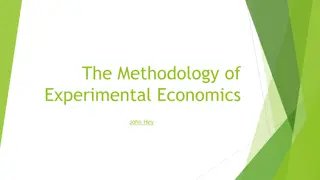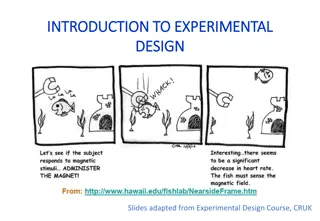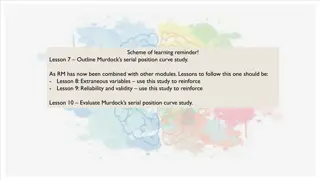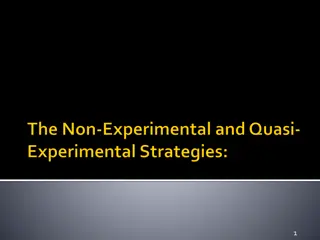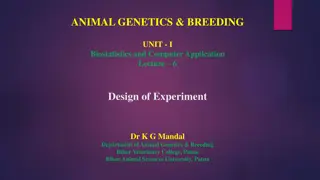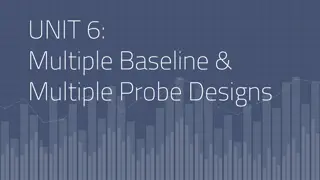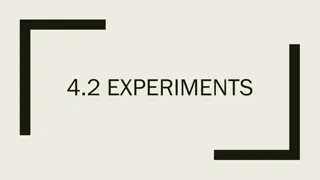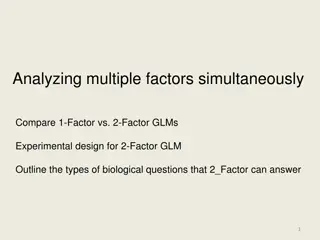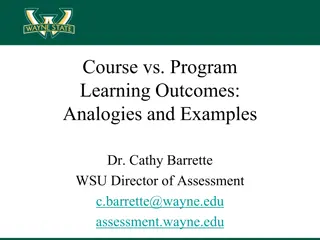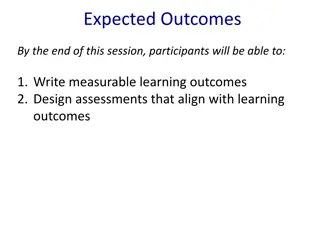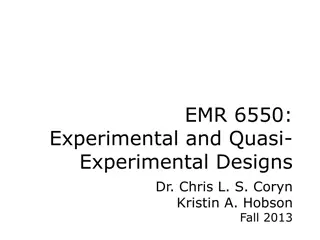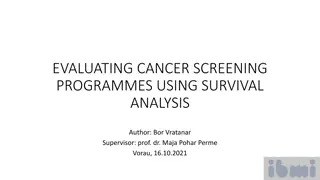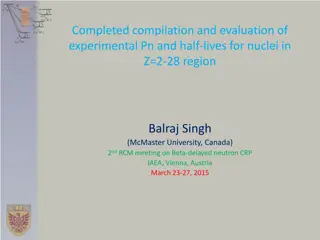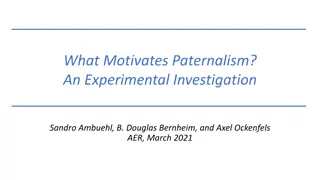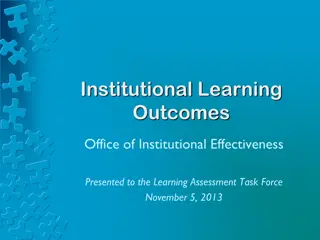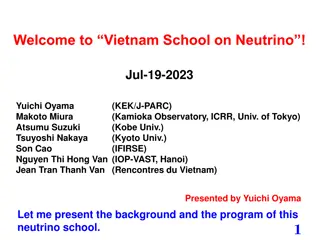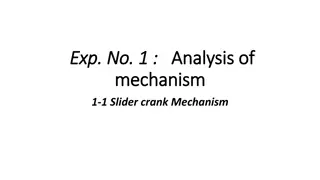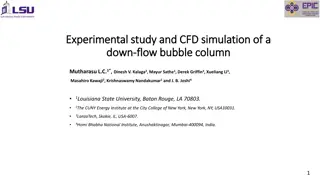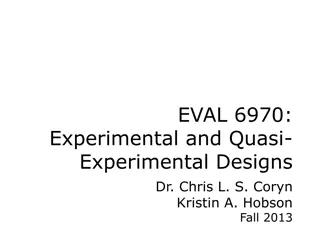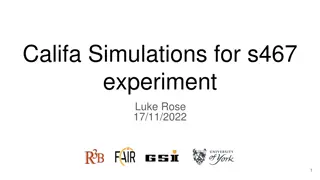Botanical Survey of India and Andaman & Nicobar Islands Conservation Projects
The Botanical Survey of India, Andaman & Nicobar Regional Centre in Port Blair has been actively involved in conservation efforts, including assessment studies and mapping of endemic trees. They have documented various species, collected germplasm, and established experimental gardens. Additionally,
0 views • 55 slides
Introduction to Experimental Economics by John Hey: A Comprehensive Overview
Explore the interconnected realms of Experimental Economics and Behavioral Economics through the insightful lectures of John Hey, an Emeritus Professor at the University of York. Discover the methodology of testing economic theories for validity and the practical applications of experimental economi
1 views • 58 slides
Insights on Experimental ASF Vaccines in Pig Studies
The research conducted by Prof. Jishu Shi and his team at Kansas State University delves into the safety and efficacy testing of experimental African Swine Fever (ASF) vaccines using pigs as the model. Various vaccines, including DNA vaccines and live attenuated viruses, were tested against differen
4 views • 13 slides
Approaches for Impact Assessment at Centurion University, India
Various approaches for impact assessment include Experimental Design, Quasi-Experimental Design, Before-After Comparison, Counterfactual Analysis, Cost-Benefit Analysis, Qualitative Methods, and Mixed Methods. These methods help evaluate the effectiveness and efficiency of interventions by measuring
0 views • 4 slides
Discussion of Randomized Experiments and Experimental Design Challenges
Randomized experiments face statistical power challenges due to rare outcomes and high variance. Stratifying randomization can help control for correlated residual variance based on baseline values of outcomes. Implications for applied economists include addressing attrition and treatment effect het
0 views • 6 slides
Key Components of Experimental Economics Methodology
Experimental economics methodology emphasizes the importance of clear objectives, controlled environments, honest instructions, and providing subjects with monetary incentives. The experimenter must have a clear objective in mind, ensure tasks are clearly stated for subjects, and analyze data accura
0 views • 12 slides
Understanding Experimental Design Principles
Explore the key elements of experimental design, from defining clear objectives to controlling for variation. Learn about the consequences of poor design and the importance of factors like replication and variables. Enhance your understanding of statistical analysis and the principles of a well-desi
0 views • 15 slides
Learning Reminder: Murdock's Serial Position Curve Study and Experimental Practice
Explore the insights of Murdock's serial position curve study and its applications in experimental psychology. Dive into the concepts of alternate and null hypothesis, Sensory Register, and memory experiments. Engage in practical learning through experiment time activities and visual aids like patch
0 views • 76 slides
Experimental Lightning Flash Prediction Based on Real-Time Forecast
This PowerPoint presentation provides real-time experimental lightning flash prediction based on initial conditions data from GFS and WRF models. The forecast covers Day 1 and Day 2 with detailed insights on 24-hour accumulated total lightning flash counts and 3-hourly accumulated total lightning fl
0 views • 8 slides
Understanding Nonexperimental and Quasi-experimental Studies
Nonexperimental and quasi-experimental studies resemble experiments but lack random assignment, making them valuable for group comparisons without establishing causation. This type of research design looks at differences between groups that already exist, focusing on group differences rather than ca
1 views • 35 slides
Design of Experiment in Animal Genetics & Breeding: Principles and Methods
Biostatistics and computer applications play a key role in the design of experiments in animal genetics and breeding. Proper allotment of treatments to experimental units is crucial to study treatment effects accurately. Designing experiments helps in maximizing information from available resources,
0 views • 37 slides
Understanding Multiple Baseline Designs in Behavioral Experiments
Multiple Baseline Designs are a type of experimental design used in behavioral research. This design involves measuring two or more behaviors concurrently in a baseline condition, applying a treatment variable to one behavior at a time while maintaining baseline conditions for others, and then seque
0 views • 34 slides
Understanding Experiments in Research: Observation vs. Experimentation
Observation and experiments are two crucial methods in research. An observational study involves observing and measuring variables without influencing responses, while an experiment deliberately applies treatments to measure responses. Confounding variables can affect the results, and factors like e
0 views • 13 slides
Understanding Experimental Psychology: Designs and Control Issues in Research
This content delves into the basics of experimental research, focusing on different types of experimental designs and control issues. It covers between-group and within-group designs, discussing advantages and disadvantages, as well as methods for controlling for nonequivalence. The importance of ra
0 views • 26 slides
Understanding EHCP Outcomes and Provision for Special Educational Needs
EHCP outcomes and provision for special educational needs are crucial components outlined in a child or young person's Education, Health, and Care Plan (EHCP). Long-term outcomes are categorized into learning areas, while medium-term outcomes serve as steps towards achieving long-term goals. It is i
0 views • 15 slides
Understanding Probability: Experimental and Theoretical Concepts
Probability is the measure of the likelihood of an event happening, with experimental and theoretical probability being key concepts. Experimental probability involves determining probabilities through experience or experiments, while theoretical probability can be calculated without prior experienc
2 views • 23 slides
Experimental Method for Measuring Oxygen Production in Green Plants
The reporter proposed an experimental method to measure oxygen production by an aquatic plant, highlighting the process and outcomes. While there were detailed explanations on photosynthesis, the report lacked essential elements such as explaining the choice of plant and the source of carbon dioxide
1 views • 5 slides
Analyzing Experimental Design with One-Factor and Two-Factor GLMs
Comparing the experimental designs of one-factor (1-way ANOVA) and two-factor GLMs, this content explores biological questions that can be answered through the analysis of multiple factors simultaneously in experiments. It discusses sample sizes, drug treatments, factor levels, and concentration var
1 views • 13 slides
Understanding Learning Outcomes: Analogies and Examples
Explore the concept of learning outcomes through analogies with salads and maps. Learning outcomes are specific, measurable statements of what students should know or be able to do after completing a program. Discover how outcomes differ at various organizational levels and how course outcomes contr
0 views • 10 slides
Quiz Review on Scientific Method and Graphing
Explore a quiz review covering topics related to scientific method, graphing, and experimental design. Understand key concepts such as hypothesis, scientific law, theory, variables, and experimental control through detailed questions and images. Test your knowledge on laboratory safety, inferences,
0 views • 14 slides
Experimental Data Analysis Report
This report covers various aspects of experimental data analysis at the research facility, including the status of INGRID, DAQ, neutrino event rate, beam center stability, event timing, and a general summary with visual representations. The efficiency of data taking, delivery and recording of spills
0 views • 6 slides
Understanding Quantitative Research Designs in Nursing
Delve into the world of quantitative research in nursing, exploring different research designs and the concept of causality. Learn about experimental, quasi-experimental, and non-experimental designs, as well as the characteristics of experimental design like manipulation, control, and randomization
0 views • 22 slides
Effective Design of Learning Outcomes and Assessments
This session covers writing measurable learning outcomes, designing assessments aligning with outcomes, creating assessments for specific outcomes, analyzing assessments to determine intended learning outcomes, and the importance of clarifying expectations for students and instructors through learni
0 views • 16 slides
Quasi-Experimental and Interrupted Time-Series Designs Overview
Explore the various quasi-experimental designs, control groups, pretests, and outcome patterns in research methodologies. Understand the implications of different outcome patterns on causal interpretation and validity threats in experimental studies.
0 views • 31 slides
Evaluating Cancer Screening Programmes Using Survival Analysis
This study explores the evaluation of cancer screening programmes through survival analysis. The purpose is to identify cancer in healthy populations to offer early treatment, under the hypothesis that early treatment leads to better outcomes. The process involves defining working hypotheses, establ
0 views • 22 slides
Understanding Experimental Design in Biology
Explore key concepts in experimental design in biology through clicker questions focusing on hypotheses, variables, control groups, and experimental groups. Learn how scientists test hypotheses and analyze results to draw valid conclusions in biological studies.
0 views • 15 slides
Compilation and Evaluation of Experimental Data for Nuclei in Z=2-28 Region
Completed compilation and evaluation of experimental Pn and half-lives for nuclei in the Z=2-28 region, led by Balraj Singh at McMaster University. The work involved preparing lists of neutron-rich nuclides, identifying potential emitters, analyzing available experimental data for 1n, 2n, 3n, and 4n
0 views • 20 slides
Advances in Ceramic Composite Property Modeling and Experimental Characterization
European research focuses on advanced modeling of C/C, C/SiC, and SiC/SiC composites for aerospace and nuclear applications, with an emphasis on correlating simulations with experimental validation. Laboratories are progressing towards a multiscale approach, integrating micro/nanomechanical characte
0 views • 5 slides
What Motivates Paternalism? An Experimental Investigation
Centuries of normative debate on paternalism have resulted in its ubiquity in various aspects of society, from consumer protection to safety regulations. However, there is a scarcity of empirical studies on the motivations behind paternalistic interventions. This experimental investigation delves in
0 views • 12 slides
Understanding Experimental Studies: Intervention, Characteristics, and Measurements
Experimental studies involve the investigator assigning exposures and following subjects to observe disease development. Different types of experimental studies exist, such as preventive and therapeutic types, each with its limitations, including ethical concerns and challenges in recruiting subject
0 views • 13 slides
Understanding Research Methods and Data Analysis
This review covers topics such as experimental classification, the comparison of non-experimental and experimental research, software features like JMP and SPSS, outlier handling in data analysis, and levels of measurement in statistical analysis.
0 views • 13 slides
Mesa Institutional Learning Outcomes Overview
Mesa's Institutional Learning Outcomes (ILOs) focus on core values such as communication, critical thinking, global awareness, personal awareness, civic responsibility, self-awareness, interpersonal skills, and technological awareness. These outcomes are designed to guide students in acquiring essen
0 views • 13 slides
Vietnam Neutrino School Overview
Vietnam School on Neutrino is an annual event started in 2017 to promote experimental neutrino physics in Vietnam. Led by Prof. Jean Tran Thanh Van, the school focuses on lectures, software and hardware training, group works, and excursions. With a mix of students from various countries, the aim is
0 views • 7 slides
Analysis of Slider-Crank Mechanism and Experimental Data
Slider-crank mechanism analysis involves understanding the transformation of input motion into desired output motion. This mechanism consists of a crank, coupler, slider, and ground link, converting circular motion into linear motion. Experimental procedures involve setting crank angles and recordin
0 views • 6 slides
Experimental Study and CFD Simulation of a Down-flow Bubble Column
This study and simulation focus on the experimental setup, measurement techniques, and results of a down-flow bubble column. It explores novel features such as inverted bubbly flow, micro-bubble generation, and gas injection. Detailed analysis includes axial and radial variations of volumetric gas h
0 views • 25 slides
Understanding Experimental and Quasi-Experimental Designs
Explore the foundations of experimental and quasi-experimental designs, delving into causal relationships, counterfactual reasoning, and the importance of validating statistical and internal conclusions. Learn about causes, effects, and the complexity of determining causation in research. Discover R
0 views • 46 slides
Understanding Probability: Learning Outcomes and Examples
This content delves into the study of probability, covering topics such as representing probabilities of simple and compound events, calculating relative frequencies, multi-step chance experiments, theoretical and experimental probabilities. It explains concepts like chance experiments, sample space
0 views • 31 slides
Understanding Experimental Studies in Epidemiology
Epidemiological studies and experimental studies play vital roles in understanding cause-and-effect relationships in research. Experimental studies involve manipulating independent variables and measuring dependent variables, with categories such as true experimental, quasi-experimental, and pre-exp
0 views • 22 slides
Califa Simulations and Experimental Observations in Nuclear Physics Research
Exploring nuclear physics research through Califa simulations and experimental observations with a focus on PID gating, clustering algorithms, beam settings, and Ca isotopes chain gating. The study involves simulating events on CH2 targets, analyzing clustering effects, and observing opening angles
0 views • 10 slides
FY25 LBS Lab OMEGA/OMEGA EP Proposed Campaign
Proposed campaign in FY25 by the LBS Lab to measure specific deliverables, compare results with experimental and theory PIs, collaborate with others, and assess technical issues such as target fabrication feasibility. The campaign involves motivation, relevant milestones, previous/simulated results,
0 views • 6 slides



